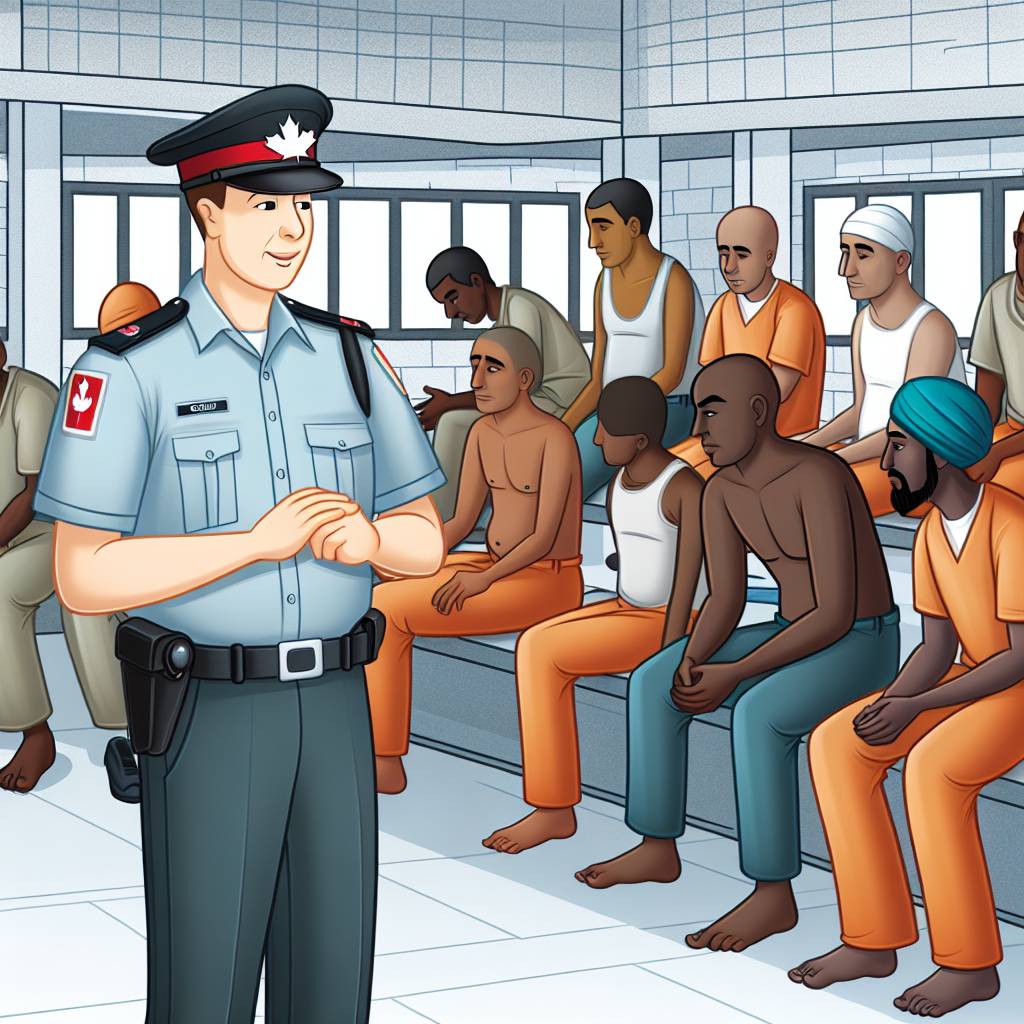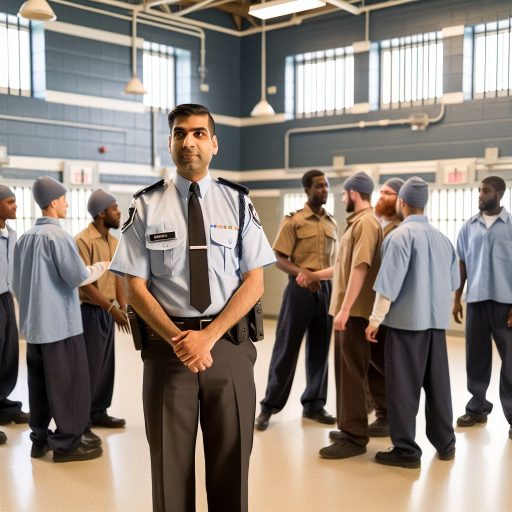Correctional Officers Have Multifaceted Responsibilities
Dispelling the Guard Myth
Many people think correctional officers are simply ‘guards.’
This perception undermines the complexity of the role.
In reality, correctional officers perform various critical duties.
They ensure safety within correctional facilities.
Additionally, they assist in inmate rehabilitation efforts.
Moreover, they enforce rules and regulations effectively.
Inmate Interaction and Support
Correctional officers frequently interact with inmates.
They provide guidance and support to promote positive behavior.
This role fosters a safer environment within the facility.
Furthermore, they report on inmate behavior regularly.
This monitoring contributes to effective inmate management.
Collaboration with Other Professionals
Correctional officers collaborate with various professionals.
They work closely with mental health experts and social workers.
This teamwork ensures that inmates receive the necessary support.
Additionally, officers facilitate group programs and activities.
Such collaboration enhances overall rehabilitation efforts.
Training and Development
Correctional officers undergo extensive training programs.
They learn about conflict resolution and crisis management.
These skills are essential for maintaining order and safety.
Additionally, ongoing training helps officers adapt to new challenges.
Continuous development is crucial for their professional growth.
The Role of Correctional Officers
Maintaining Order and Safety
Many people believe correctional officers only enforce rules.
However, their role extends beyond mere discipline.
Control and safety are paramount in correctional facilities.
Securing inmates is just one aspect of their duties.
Unlock Your Career Potential
Visualize a clear path to success with our tailored Career Consulting service. Personalized insights in just 1-3 days.
Get StartedBuilding Relationships with Inmates
Correctional officers often build rapport with inmates.
They aim to establish trust and open communication.
This approach enhances safety and promotes rehabilitation.
It’s a common misconception that officers are strictly adversarial.
Promoting Rehabilitation
Correctional officers play a vital role in inmate rehabilitation.
They participate in various programs and activities.
For instance, they may lead educational workshops.
These efforts help inmates reintegrate into society.
Teamwork with Other Professionals
Correctional officers collaborate with mental health staff.
They work alongside social workers to address inmate needs.
This teamwork ensures that inmates receive comprehensive care.
They are part of a larger system.
Handling Crisis Situations
Often, correctional officers respond to crises within facilities.
They are trained to de-escalate conflicts effectively.
This skill helps maintain a calm environment for everyone.
Moreover, they are equipped to manage emergencies swiftly.
Correctional Officers and Their Training Requirements
Formal Education in Correctional Work
Many believe that correctional officers do not require formal education.
This misconception overlooks the importance of proper training.
In reality, most correctional facilities prefer candidates with some college education.
Additionally, degrees in criminal justice or sociology can be beneficial.
Training Programs for Correctional Officers
Correctional officers must successfully complete training programs.
These programs often include both classroom instruction and hands-on experience.
Training covers topics like conflict resolution and crisis management.
Moreover, physical fitness training is also a critical component.
Certification and Ongoing Training
After initial training, many states require certification for officers.
This certification ensures that officers possess necessary skills and knowledge.
Furthermore, ongoing training is essential to maintain these skills.
Officers often attend workshops and refresher courses throughout their careers.
The Role of Professional Development
Professional development significantly impacts an officer’s effectiveness.
Advancing education can lead to promotions and specialized roles.
For instance, officers may train in mental health first aid.
This training helps officers better understand inmate needs and behaviors.
The Importance of Proper Training
Misconceptions about correctional officer training can be misleading.
Formal education and training are crucial for maintaining safety and security.
Ultimately, a well-trained officer contributes to a more effective correctional system.
Find Out More: Work Environments for Canadian Environmental Officers
Common Misconceptions About Correctional Officers
Correctional Officers Work Outside Prisons and Jails
Many people believe that all correctional officers serve only in prisons and jails.
In reality, their roles extend to community corrections as well.
Correctional officers operate in various environments, not just confined spaces.
The Role of Community Corrections
Community corrections involve supervising individuals placed on probation or parole.
These officers focus on rehabilitation rather than punitive measures.
This job requires strong interpersonal skills and a commitment to public safety.
Importance of Diverse Settings
Officers in community settings often engage with local resources and services.
This engagement helps integrate individuals back into society smoothly.
Additionally, these roles promote accountability and reduce recidivism rates.
Clarifying Misunderstandings
Many misconceptions arise from limited exposure to correctional work.
Thus, public perceptions often lack awareness of community correction highlights.
Understanding these roles can foster greater respect for correctional officers.
Find Out More: Career Opportunities for Veterans Affairs Officers
Common Misconceptions About Correctional Officers
The Role of Correctional Officers
Many people believe correctional officers only enforce rules in prisons.
However, their duties extend beyond mere enforcement.
Correctional officers play a significant role in rehabilitation efforts.
They work closely with inmates, fostering a safer environment.
In addition, they help prepare inmates for successful reintegration into society.
Supportive Functions of Correctional Officers
Correctional officers often provide guidance to inmates.
This guidance helps inmates navigate their circumstances more effectively.
Moreover, they participate in educational programs within facilities.
Such programs encourage skill development and personal growth.
Ultimately, their involvement promotes a culture of accountability and responsibility.
Collaboration with Other Professionals
Correctional officers work alongside counselors and social workers.
This collaboration is vital for developing comprehensive rehabilitation plans.
They participate in meetings to discuss inmate progress and challenges.
Additionally, they help ensure that inmates access necessary mental health services.
By doing so, they contribute to the overall well-being of the inmate population.
Impact on Recidivism Rates
The involvement of correctional officers can significantly affect recidivism rates.
Research shows that supportive environments reduce the likelihood of reoffending.
Correctional officers can inspire positive changes through their interactions.
This influence may lead to better life choices for former inmates.
In essence, they serve as crucial figures in the rehabilitation process.
Find Out More: Environmental Officer Career Opportunities in Canada

Common Misconceptions About Correctional Officers
Understanding Inmate Behavior
Not all inmates are dangerous individuals.
This misconception oversimplifies the complex nature of incarceration.
Many inmates are in prison for non-violent crimes.
For instance, drug-related offenses make up a significant portion.
Consequently, correctional officers often deal with diverse inmate populations.
The Role of Correctional Officers
Correctional officers perform duties beyond ensuring safety.
They serve as mentors and provide support to inmates.
This role fosters rehabilitation and personal growth.
Additionally, they conduct programs that promote education and skills development.
This approach helps prepare inmates for successful reintegration.
Daily Responsibilities
Correctional officers engage in routine tasks daily.
They maintain order and enforce institutional rules effectively.
Moreover, they manage conflicts and mediate disputes among inmates.
Building relationships helps officers understand inmates better.
Such interactions create a safer environment for everyone involved.
Training and Preparedness
Correctional officers undergo extensive training for their roles.
They learn conflict resolution and emergency response techniques.
Additionally, they receive education on mental health issues.
This knowledge enhances their ability to support inmates effectively.
As a result, they can address various needs and challenges.
The Importance of Empathy
Empathy plays a crucial role in a correctional officer’s job.
By understanding inmate backgrounds, officers can respond better.
They often encounter individuals facing significant hardships.
Showing compassion contributes to a more positive atmosphere.
Ultimately, this can lead to improved rehabilitation outcomes.
Find Out More: Environmental Laws Every Canadian Officer Should Know
Correctional Officers and Emotional Challenges
Understanding the Myths
Many believe correctional officers lack emotional challenges at work.
This misconception can lead to a lack of support for these professionals.
However, the reality is quite different from popular belief.
Daily Stressors in the Job
Correctional officers regularly face high-stress situations.
They manage inmate conflicts, which can escalate quickly.
Every day, they maintain safety in a volatile environment.
Additionally, they often witness traumatic events firsthand.
Such incidents can take a toll on their mental health.
Impact of Isolation and Environment
The correctional environment can feel isolating for officers.
Interactions with inmates may limit social relationships outside work.
As a result, they might experience feelings of loneliness.
Moreover, long hours and shifts can disrupt their life balance.
Recognizing Mental Health Needs
One major challenge is the stigma surrounding mental health in this field.
Due to this stigma, officers may avoid seeking help.
They might not openly discuss their emotional struggles.
However, addressing mental health is critical for their well-being.
Support Systems and Resources
Organizations are beginning to recognize the need for support.
Mental health resources specifically for correctional officers are being developed.
Many facilities are implementing wellness programs to help.
These programs aim to reduce stress and promote mental resilience.
Implications of Misconceptions
Correctional officers face significant emotional challenges.
Correcting misconceptions about their mental health is essential.
Support and understanding can lead to better outcomes for these professionals.
Career Advancement Opportunities for Correctional Officers
Understanding the Misconception
Many believe correctional officers face limited career advancement opportunities.
This misconception often stems from a lack of knowledge about the field.
In reality, numerous pathways exist for officers seeking advancement.
Available Advancement Paths
Correctional officers can move into specialized roles.
Positions such as sergeant, lieutenant, or warden are accessible.
Each role has specific requirements and responsibilities.
Moreover, many facilities provide training and development programs.
The Importance of Additional Training
Professional development enhances promotion prospects for correctional officers.
Various institutions offer workshops and certifications.
Training often focuses on leadership and crisis management skills.
Completing these programs can significantly improve an officer’s qualifications.
Networking and Mentorship Opportunities
Networking plays a crucial role in career advancement.
Correctional officers can connect with experienced colleagues.
Many agencies encourage mentorship between seasoned and new officers.
This fosters a supportive environment for career growth.
Employee Support Programs
Many correctional facilities have support programs for staff members.
These programs can help officers navigate their career paths.
They may include counseling, skill development, and promotional assistance.
Utilizing these resources can lead to successful career advancements.
Additional Resources
An investigation into the formation and recruitment processes of …




